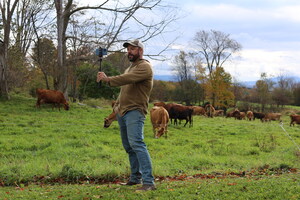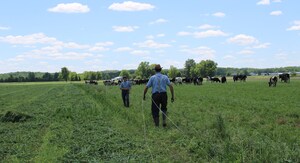LA FARGE, Wis., Oct. 25, 2017 /PRNewswire/ -- Organic Valley, America's largest cooperative of organic farmers and a leading organic brand, today announced a first-of-its-kind community partnership that will enable Organic Valley to become the largest food company in the world to source 100 percent of its electricity from renewable sources. In doing so, Organic Valley is embarking on an aggressive path to become carbon neutral.
"Our future demands bold new thinking about our sources of energy, and there is nothing more natural to a farmer than harnessing the power of the sun and the wind," said George Siemon, CEO and a founding farmer of Organic Valley. "So our cooperative is committed to achieving 100 percent renewable power, and doing it in partnership with the rural communities where we live and work."
Global leadership, word-class partners, and regional impact
Organic Valley is collaborating with the Upper Midwest Municipal Energy Group (UMMEG) and OneEnergy Renewables to create the new community solar partnership. Together, the partners will initiate over 12 megawatts (MW) of solar installations in Wisconsin. The electricity created by this partnership will not only enable Organic Valley to cover 100 percent of its electric energy needs from renewable sources by 2019, but also increase overall solar energy use in Wisconsin by 15 percent. Beyond the 12 MW project portfolio, an additional 17-plus MW expected to be constructed as well, resulting in nearly 30 MW of new solar in the region. Critical to this partnership, Organic Valley will purchase renewable energy credits from the solar projects near their headquarters and distribution center enabling the cooperative to be fully renewable-powered.
As a result of the partnership, all participating communities will receive lower and more stable electric costs and the environmental benefits of renewable power.
Additionally, the community solar partnership will adopt pollinator-friendly solar standards as part of Organic Valley's commitment to animals, people and the planet. Rather than being planted with turf grass or covered in gravel, the installations will incorporate pollinator-friendly habitat into the design. Once complete, these meadows, filled with native flowering plants and grasses, will create as much bee and butterfly habitat as if 30,000 families were to each plant six-by-twelve-foot pollinator gardens.
UMMEG is a municipal joint action agency that provides a range of services to its 15 municipal members in Wisconsin, Iowa and Minnesota, including the purchase of cost-competitive energy and transmission service through long term contracts. Previous contracts have included the Rugby Wind Project in North Dakota and the Cashton Greens Wind Project in Wisconsin, pioneering projects in the regions they serve.
OneEnergy Renewables is a leading developer of community and utility-scale solar energy projects across the United States. With offices in southern Wisconsin, the company is committed to serving the needs of communities, businesses, and utilities through the Midwest. As a certified B Corporation, OneEnergy exceeds rigorous standards of business, social and environmental performance, accountability and transparency—including recently developing Maryland's first certified pollinator-friendly solar site, with energy supplying the Verizon Center and National Geographic Society in Washington, DC. OneEnergy's solar projects provide energy to institutions such as Johns Hopkins Medicine, General Electric, and Ithaca College, as well as utilities such as Washington Gas & Electric, PacifiCorp and Portland General Electric.
Sustainable and scalable from the start
"Organic Valley was built on an environmental ethic, promoting ecological and economic sustainability," said Jonathan Reinbold, head of sustainability, Organic Valley. "As leaders in food and farming, it is our responsibility to pioneer change for good. Our hope is that this partnership to install community-scale solar will be replicated by municipal utilities around the country and propel more rural communities toward economic stability and energy independence."
Founded in 1988 by seven farm families with the mission of keeping farmers on the land, Organic Valley today has convened more than 2,000 family farms and converted over 40,000 acres of organic agricultural land. Thanks to its farmer-owned cooperative model, it has provided a lifeline to farm families from Maine to California and achieved over $1 billion in annual sales.
Leading up to this new community solar partnership, Organic Valley has demonstrated its commitment to the environment year-by-year, from implementing on-farm biodiesel to now adopting pollinator-friendly solar standards. In addition to investing $6 million in its renewable energy systems over the past six years, Organic Valley key sustainability achievements include:
- Pioneering organic production practices and helping create the National Organic Standards in 1990, which included specific criteria for livestock on pasture and were adopted by the organic industry.
- Keeping nearly 300 million pounds of persistent pesticides and synthetic fertilizers off the land since 1988.
- Leading the creation of Cashton Greens Wind Farm in 2012, a five-megawatt community wind farm, the first of its kind in Wisconsin, producing enough electricity to power 1,000 homes.
"To keep farmers on the land, you need to be good stewards of the land," continued Siemon. "Working in cooperation with nature has always been at the heart of our work, and we look forward to partnering with these rural communities to bring us all a stable source of renewable energy."
Organic Valley: Independent and Farmer-Owned
Organic Valley is America's largest cooperative of organic farmers and one of the nation's leading organic brands. Organized in 1988, it represents more than 2,000 farmers in 36 states. Focused on its founding mission of saving family farms through organic farming, Organic Valley produces a variety of organic foods, including organic dairy milk, eggs, produce, and soy products, which are sold in supermarkets, natural foods stores and food cooperatives nationwide. With its regional model, milk is produced, bottled and distributed right in the region where it is farmed to ensure fewer miles from farm to table and to support our local economies. Organic Valley produces a variety of organic foods, including organic milk, cheese, butter, spreads, creams, eggs, soy and produce, which are sold in supermarkets, natural foods stores and food cooperatives nationwide. For further information visit www.organicvalley.coop. Organic Valley is also on Twitter @OrganicValley and Facebook www.facebook.com/OrganicValley.
Media Contact:
Elizabeth Horton
[email protected]
(207) 838-0084
SOURCE Organic Valley
Related Links
WANT YOUR COMPANY'S NEWS FEATURED ON PRNEWSWIRE.COM?
Newsrooms &
Influencers
Digital Media
Outlets
Journalists
Opted In






Share this article